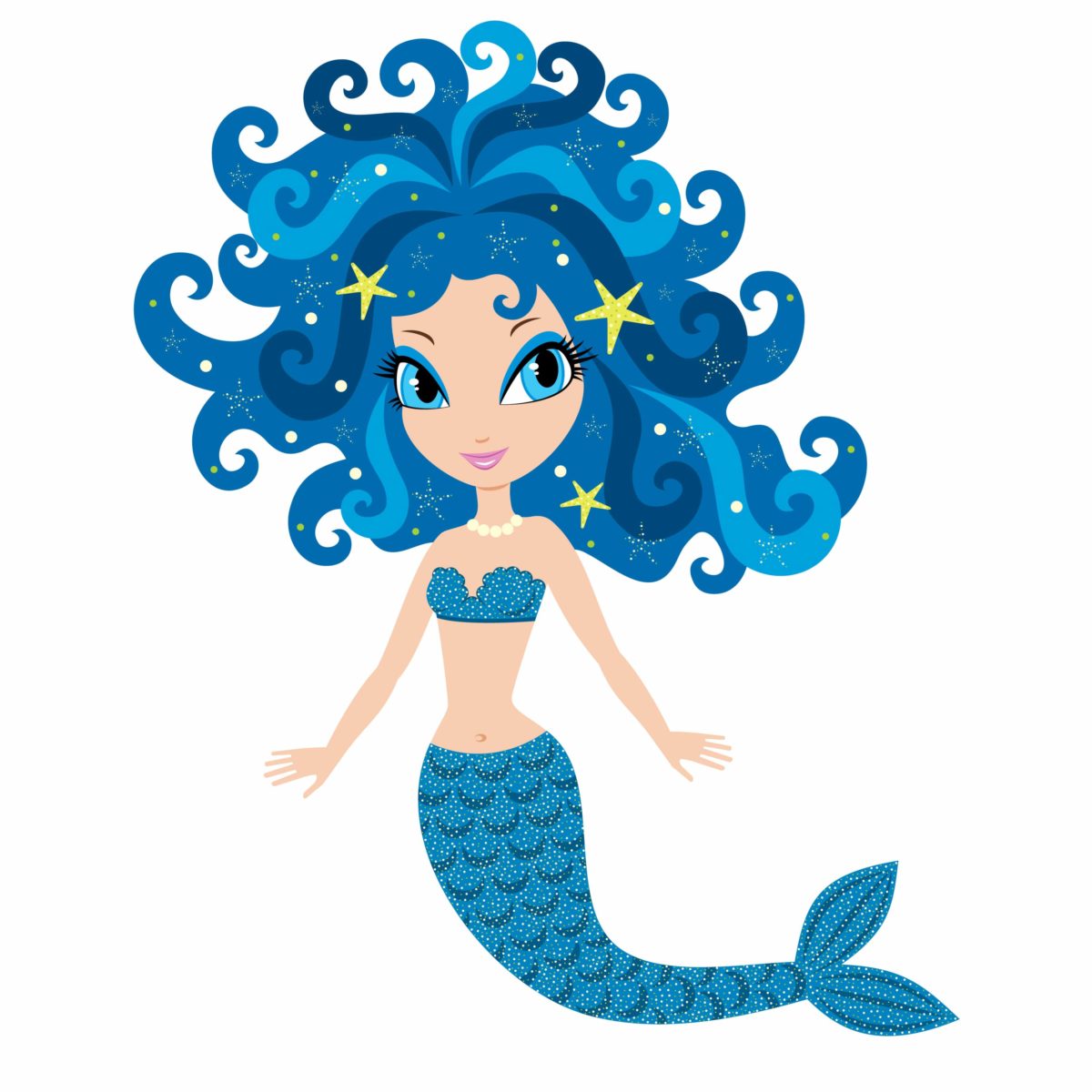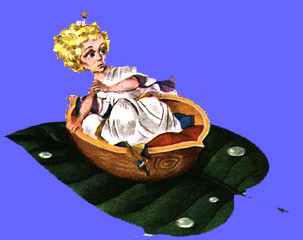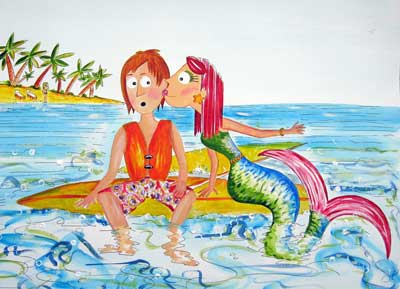Great audiobook "The Little Mermaid Part Two - Hans Christian Andersen" online free
Download the audio to your computer (right click, save as)
 In the second part of this classic tale by Hans Christian Andersen, The Little Mermaid saves a young prince from drowning - but he never has a chance to see that he owes his life to her. The Little Mermaid speaks to her grandmother, who tells her that human beings have short lives on earth, but possess immortal souls. Mermaids on the other hand, can live for 300 years, but then they turn to nothing. The only way a mermaid can become gain a soul is for a human being to love her. The Little Mermaid decides to risk all for her prince.
In the second part of this classic tale by Hans Christian Andersen, The Little Mermaid saves a young prince from drowning - but he never has a chance to see that he owes his life to her. The Little Mermaid speaks to her grandmother, who tells her that human beings have short lives on earth, but possess immortal souls. Mermaids on the other hand, can live for 300 years, but then they turn to nothing. The only way a mermaid can become gain a soul is for a human being to love her. The Little Mermaid decides to risk all for her prince.
The Music is Pachelbel's Canon. Part one is here
Read by Natasha. Duration 28 Minutes.
At last she reached her fifteenth year. "Well, now, you are grown up," said the old dowager, her grandmother; "so you must let me adorn you like your other sisters;" and she placed a wreath of white lilies in her hair, and every flower leaf was half a pearl. Then the old lady ordered eight great oysters to attach themselves to the tail of the princess to show her high rank.
"But they hurt me so," said the little mermaid.
"Pride must suffer pain," replied the old lady. Oh, how gladly she would have shaken off all this grandeur, and laid aside the heavy wreath! The red flowers in her own garden would have suited her much better, but she could not help herself: so she said, "Farewell," and rose as lightly as a bubble to the surface of the water. The sun had just set as she raised her head above the waves; but the clouds were tinted with crimson and gold, and through the glimmering twilight beamed the evening star in all its beauty. The sea was calm, and the air mild and fresh. A large ship, with three masts, lay becalmed on the water, with only one sail set; for not a breeze stiffed, and the sailors sat idle on deck or amongst the rigging. There was music and song on board; and, as darkness came on, a hundred colored lanterns were lighted, as if the flags of all nations waved in the air. The little mermaid swam close to the cabin windows; and now and then, as the waves lifted her up, she could look in through clear glass window-panes, and see a number of well-dressed people within. Among them was a young prince, the most beautiful of all, with large black eyes; he was sixteen years of age, and his birthday was being kept with much rejoicing. The sailors were dancing on deck, but when the prince came out of the cabin, more than a hundred rockets rose in the air, making it as bright as day. The little mermaid was so startled that she dived under water; and when she again stretched out her head, it appeared as if all the stars of heaven were falling around her, she had never seen such fireworks before. Great suns spurted fire about, splendid fireflies flew into the blue air, and everything was reflected in the clear, calm sea beneath. The ship itself was so brightly illuminated that all the people, and even the smallest rope, could be distinctly and plainly seen. And how handsome the young prince looked, as he pressed the hands of all present and smiled at them, while the music resounded through the clear night air.
It was very late; yet the little mermaid could not take her eyes from the ship, or from the beautiful prince. The colored lanterns had been extinguished, no more rockets rose in the air, and the cannon had ceased firing; but the sea became restless, and a moaning, grumbling sound could be heard beneath the waves: still the little mermaid remained by the cabin window, rocking up and down on the water, which enabled her to look in. After a while, the sails were quickly unfurled, and the noble ship continued her passage; but soon the waves rose higher, heavy clouds darkened the sky, and lightning appeared in the distance. A dreadful storm was approaching; once more the sails were reefed, and the great ship pursued her flying course over the raging sea. The waves rose mountains high, as if they would have overtopped the mast; but the ship dived like a swan between them, and then rose again on their lofty, foaming crests. To the little mermaid this appeared pleasant sport; not so to the sailors. At length the ship groaned and creaked; the thick planks gave way under the lashing of the sea as it broke over the deck; the mainmast snapped asunder like a reed; the ship lay over on her side; and the water rushed in. The little mermaid now perceived that the crew were in danger; even she herself was obliged to be careful to avoid the beams and planks of the wreck which lay scattered on the water. At one moment it was so pitch dark that she could not see a single object, but a flash of lightning revealed the whole scene; she could see every one who had been on board excepting the prince; when the ship parted, she had seen him sink into the deep waves, and she was glad, for she thought he would now be with her; and then she remembered that human beings could not live in the water, so that when he got down to her father's palace he would be quite dead. But he must not die. So she swam about among the beams and planks which strewed the surface of the sea, forgetting that they could crush her to pieces. Then she dived deeply under the dark waters, rising and falling with the waves, till at length she managed to reach the young prince, who was fast losing the power of swimming in that stormy sea. His limbs were failing him, his beautiful eyes were closed, and he would have died had not the little mermaid come to his assistance. She held his head above the water, and let the waves drift them where they would.
In the morning the storm had ceased; but of the ship not a single fragment could be seen. The sun rose up red and glowing from the water, and its beams brought back the hue of health to the prince's cheeks; but his eyes remained closed. The mermaid kissed his high, smooth forehead, and stroked back his wet hair; he seemed to her like the marble statue in her little garden, and she kissed him again, and wished that he might live. Presently they came in sight of land; she saw lofty blue mountains, on which the white snow rested as if a flock of swans were lying upon them. Near the coast were beautiful green forests, and close by stood a large building, whether a church or a convent she could not tell. Orange and citron trees grew in the garden, and before the door stood lofty palms. The sea here formed a little bay, in which the water was quite still, but very deep; so she swam with the handsome prince to the beach, which was covered with fine, white sand, and there she laid him in the warm sunshine, taking care to raise his head higher than his body. Then bells sounded in the large white building, and a number of young girls came into the garden. The little mermaid swam out farther from the shore and placed herself between some high rocks that rose out of the water; then she covered her head and neck with the foam of the sea so that her little face might not be seen, and watched to see what would become of the poor prince. She did not wait long before she saw a young girl approach the spot where he lay. She seemed frightened at first, but only for a moment; then she fetched a number of people, and the mermaid saw that the prince came to life again, and smiled upon those who stood round him. But to her he sent no smile; he knew not that she had saved him. This made her very unhappy, and when he was led away into the great building, she dived down sorrowfully into the water, and returned to her father's castle. She had always been silent and thoughtful, and now she was more so than ever. Her sisters asked her what she had seen during her first visit to the surface of the water; but she would tell them nothing. Many an evening and morning did she rise to the place where she had left the prince. She saw the fruits in the garden ripen till they were gathered, the snow on the tops of the mountains melt away; but she never saw the prince, and therefore she returned home, always more sorrowful than before. It was her only comfort to sit in her own little garden, and fling her arm round the beautiful marble statue which was like the prince; but she gave up tending her flowers, and they grew in wild confusion over the paths, twining their long leaves and stems round the branches of the trees, so that the whole place became dark and gloomy. At length she could bear it no longer, and told one of her sisters all about it. Then the others heard the secret, and very soon it became known to two mermaids whose intimate friend happened to know who the prince was. She had also seen the festival on board ship, and she told them where the prince came from, and where his palace stood.
"Come, little sister," said the other princesses; then they entwined their arms and rose up in a long row to the surface of the water, close by the spot where they knew the prince's palace stood. It was built of bright yellow shining stone, with long flights of marble steps, one of which reached quite down to the sea. Splendid gilded cupolas rose over the roof, and between the pillars that surrounded the whole building stood life-like statues of marble. Through the clear crystal of the lofty windows could be seen noble rooms, with costly silk curtains and hangings of tapestry; while the walls were covered with beautiful paintings which were a pleasure to look at. In the centre of the largest saloon a fountain threw its sparkling jets high up into the glass cupola of the ceiling, through which the sun shone down upon the water and upon the beautiful plants growing round the basin of the fountain. Now that she knew where he lived, she spent many an evening and many a night on the water near the palace. She would swim much nearer the shore than any of the others ventured to do; indeed once she went quite up the narrow channel under the marble balcony, which threw a broad shadow on the water. Here she would sit and watch the young prince, who thought himself quite alone in the bright moonlight. She saw him many times of an evening sailing in a pleasant boat, with music playing and flags waving. She peeped out from among the green rushes, and if the wind caught her long silvery-white veil, those who saw it believed it to be a swan, spreading out its wings. On many a night, too, when the fishermen, with their torches, were out at sea, she heard them relate so many good things about the doings of the young prince, that she was glad she had saved his life when he had been tossed about half-dead on the waves. And she remembered that his head had rested on her bosom, and how heartily she had kissed him; but he knew nothing of all this, and could not even dream of her. She grew more and more fond of human beings, and wished more and more to be able to wander about with those whose world seemed to be so much larger than her own. They could fly over the sea in ships, and mount the high hills which were far above the clouds; and the lands they possessed, their woods and their fields, stretched far away beyond the reach of her sight. There was so much that she wished to know, and her sisters were unable to answer all her questions. Then she applied to her old grandmother, who knew all about the upper world, which she very rightly called the lands above the sea.
"If human beings are not drowned," asked the little mermaid, "can they live forever? do they never die as we do here in the sea?"
"Yes," replied the old lady, "they must also die, and their term of life is even shorter than ours. We sometimes live to three hundred years, but when we cease to exist here we only become the foam on the surface of the water, and we have not even a grave down here of those we love. We have not immortal souls, we shall never live again; but, like the green sea-weed, when once it has been cut off, we can never flourish more. Human beings, on the contrary, have a soul which lives forever, lives after the body has been turned to dust. It rises up through the clear, pure air beyond the glittering stars. As we rise out of the water, and behold all the land of the earth, so do they rise to unknown and glorious regions which we shall never see."
"Why have not we an immortal soul?" asked the little mermaid mournfully; "I would give gladly all the hundreds of years that I have to live, to be a human being only for one day, and to have the hope of knowing the happiness of that glorious world above the stars."
"You must not think of that," said the old woman; "we feel ourselves to be much happier and much better off than human beings."
"So I shall die," said the little mermaid, "and as the foam of the sea I shall be driven about never again to hear the music of the waves, or to see the pretty flowers nor the red sun. Is there anything I can do to win an immortal soul?"
"No," said the old woman, "unless a man were to love you so much that you were more to him than his father or mother; and if all his thoughts and all his love were fixed upon you, and the priest placed his right hand in yours, and he promised to be true to you here and hereafter, then his soul would glide into your body and you would obtain a share in the future happiness of mankind. He would give a soul to you and retain his own as well; but this can never happen. Your fish's tail, which amongst us is considered so beautiful, is thought on earth to be quite ugly; they do not know any better, and they think it necessary to have two stout props, which they call legs, in order to be handsome."
Then the little mermaid sighed, and looked sorrowfully at her fish's tail. "Let us be happy," said the old lady, "and dart and spring about during the three hundred years that we have to live, which is really quite long enough; after that we can rest ourselves all the better. This evening we are going to have a court ball."
It is one of those splendid sights which we can never see on earth. The walls and the ceiling of the large ball-room were of thick, but transparent crystal. May hundreds of colossal shells, some of a deep red, others of a grass green, stood on each side in rows, with blue fire in them, which lighted up the whole saloon, and shone through the walls, so that the sea was also illuminated. Innumerable fishes, great and small, swam past the crystal walls; on some of them the scales glowed with a purple brilliancy, and on others they shone like silver and gold. Through the halls flowed a broad stream, and in it danced the mermen and the mermaids to the music of their own sweet singing. No one on earth has such a lovely voice as theirs. The little mermaid sang more sweetly than them all. The whole court applauded her with hands and tails; and for a moment her heart felt quite gay, for she knew she had the loveliest voice of any on earth or in the sea. But she soon thought again of the world above her, for she could not forget the charming prince, nor her sorrow that she had not an immortal soul like his; therefore she crept away silently out of her father's palace, and while everything within was gladness and song, she sat in her own little garden sorrowful and alone. Then she heard the bugle sounding through the water, and thought- "He is certainly sailing above, he on whom my wishes depend, and in whose hands I should like to place the happiness of my life. I will venture all for him, and to win an immortal soul, while my sisters are dancing in my father's palace, I will go to the sea witch, of whom I have always been so much afraid, but she can give me counsel and help."
And then the little mermaid went out from her garden, and took the road to the foaming whirlpools, behind which the sorceress lived. She had never been that way before: neither flowers nor grass grew there; nothing but bare, gray, sandy ground stretched out to the whirlpool, where the water, like foaming mill-wheels, whirled round everything that it seized, and cast it into the fathomless deep. Through the midst of these crushing whirlpools the little mermaid was obliged to pass, to reach the dominions of the sea witch; and also for a long distance the only road lay right across a quantity of warm, bubbling mire, called by the witch her turfmoor. Beyond this stood her house, in the centre of a strange forest, in which all the trees and flowers were polypi, half animals and half plants; they looked like serpents with a hundred heads growing out of the ground. The branches were long slimy arms, with fingers like flexible worms, moving limb after limb from the root to the top. All that could be reached in the sea they seized upon, and held fast, so that it never escaped from their clutches. The little mermaid was so alarmed at what she saw, that she stood still, and her heart beat with fear, and she was very nearly turning back; but she thought of the prince, and of the human soul for which she longed, and her courage returned. She fastened her long flowing hair round her head, so that the polypi might not seize hold of it. She laid her hands together across her bosom, and then she darted forward as a fish shoots through the water, between the supple arms and fingers of the ugly polypi, which were stretched out on each side of her. She saw that each held in its grasp something it had seized with its numerous little arms, as if they were iron bands. The white skeletons of human beings who had perished at sea, and had sunk down into the deep waters, skeletons of land animals, oars, rudders, and chests of ships were lying tightly grasped by their clinging arms; even a little mermaid, whom they had caught and strangled; and this seemed the most shocking of all to the little princess.
She now came to a space of marshy ground in the wood, where large, fat water-snakes were rolling in the mire, and showing their ugly, drab-colored bodies. In the midst of this spot stood a house, built with the bones of shipwrecked human beings. There sat the sea witch, allowing a toad to eat from her mouth, just as people sometimes feed a canary with a piece of sugar. She called the ugly water-snakes her little chickens, and allowed them to crawl all over her bosom.
Listen audio books mp3 🔊

- Genre: Legends & Fairy Tales
- Author: Hans Christian Andersen




